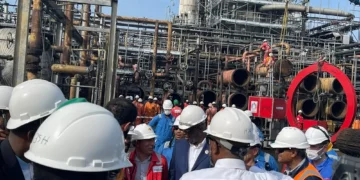The Nigerian automobile industry is facing significant hiccups, as rising importation of foreign vehicles and high inflation rates continue to threaten the progress of local vehicle manufacturing and assembly.
Authorities in the industry have raised concerns that these factors could undermine government efforts to boost domestic automotive production, reduce unemployment, and stimulate economic growth.
Over the past decade, the Nigerian government has introduced various policies aimed at encouraging local vehicle production, including tariffs on imported cars and incentives for assembly plants. However, the persistent influx of foreign-used vehicles, often smuggled or brought in through informal trade channels, has undercut these efforts.
At the same time, Nigeria’s high inflation rate has increased the costs of manufacturing inputs such as raw materials, spare parts, and logistics. This has pushed up the prices of locally assembled vehicles, further eroding their competitiveness against imported alternatives. Inflation also affects consumers’ purchasing power, limiting their ability to afford new cars, whether assembled locally or imported.
Stakeholders in the industry have warned that if these challenges are not addressed urgently, the local manufacturing sector risks stagnation or decline. This would have a ripple effect on job creation, technology transfer, and Nigeria’s ambition to become a regional automotive hub.
An automotive development expert, Luqman Mamudu, expressed deep concerns about the viability of Nigeria’s automotive development programme under the current investment climate.
He stated, “It is most unlikely that the Nigerian automotive development programme can survive in the present investment environment. A country aspiring to develop and grow a local automotive industry must control the inflow of used vehicles. Nigeria’s borders have practically been opened to the free import of used vehicles from everywhere in the world, seeking a destination for their end-of-life vehicles.
“New automotive manufacturing and assembly plants cannot compete on any grounds, especially regarding prices, without a reasonably affordable credit finance scheme backed by government intervention. This scheme, which was fully planned and sanctioned by the Central Bank of Nigeria under a provisional licence, has been abandoned since 2015.”
Mamudu, who formerly served as Director of Policy and Planning at the National Automotive Design and Development Council (NADDC), further explained the negative impact of recent policy changes:“The Nigerian Finance Act of 2020 yielded to pressure from used vehicle importers, who misled the government into believing that the protective and concessionary measures supporting local assembly were driving up vehicle prices.
“As a result, tariffs on imported new and used commercial vehicles were slashed overnight from 35 per cent to 10 per cent, alongside reduced import duties on semi-knocked-down parts used by assembly plants. This made importing SKD kits economically unviable, leading affected assembly plants to lay off workers and resort entirely to imports.”
On the current situation, Mamudu lamented, “Today, the entire Nigerian automotive space has turned into a vast parking lot for second-hand cars dumped from all over the world.”
He warned about the particularly worrying situation in Abuja, FCT, saying, “the highways in Abuja, once occupied by florists, are gradually being replaced by car sales outlets. The FCT authorities must intervene to halt this undesirable development.”
Mamudu concluded with a call to action, urging the Nigerian Automotive Development Policy, which was endorsed by the Federal Executive Council, should be urgently submitted to the National Assembly for consideration.
A fellow of the Nigerian Institute of Mechanical Engineers, automobile engineer, and chairman of the board of directors of driving schools in Nigeria, Engr. Saliyu Aliyu highlighted the significant challenges holding back the country’s automotive industry.
According to him, Nigeria lags behind largely due to a lack of political will. Despite the availability of skilled technicians and relevant technologies capable of making a real impact, these resources remain undervalued, particularly within academic circles.
Engr Aliyu criticised the regulatory framework, pointing out that only registered engineers receive formal recognition under Nigerian law. This restriction stifles innovation, as unregistered inventors and developers are often barred from advancing their ideas. “It’s Nigerians hindering ourselves,” he said.
He noted that, “the automotive industry could generate more revenue than any other sector if the right people were empowered with minimal government support. I speak from experience, having worked in one of the largest automotive companies in the country.”
Promise Akpan, an automotive engineer actively working in the sector, warned that Nigeria’s heavy reliance on imported vehicles subjects consumers to inflated costs that most can ill afford. He noted that while local production is vital, importation remains unavoidable without domestic industry capacity. Granting licences to prospective local manufacturers alone does not constitute government support.
He said true growth required sustained investment, partnerships with global producers for technical expertise and policies that encourage production.
Akpan stressed that prices for locally assembled vehicles would inevitably differ from imported models due to production costs. However, he said Nigeria’s homegrown automotive industry could thrive with cohesive planning, investment, and policy implementation by stakeholders and the government.
To turn the industry around, Akpan advocated learning from developed countries by sending Nigerians abroad for training, who can then return to upgrade local capabilities. They also recommended dedicated budget allocations to support local manufacturers and workforce development, including setting clear targets for establishing automotive plants nationwide. Such strategic efforts, they believe, can unlock the sector’s vast potential and reduce the nation’s dependence on costly vehicle imports.





